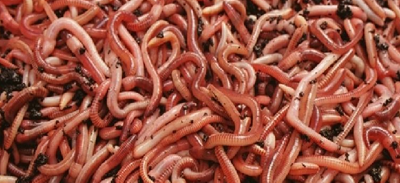 In the coat closet of my tiny one-bedroom apartment, next to a suitcase and my winter boots, is my blue plastic worm bin. I have been composting with worms for about a year, and cannot imagine going back.
In the coat closet of my tiny one-bedroom apartment, next to a suitcase and my winter boots, is my blue plastic worm bin. I have been composting with worms for about a year, and cannot imagine going back.
I am still in awe of the efficiency with which my worms work, and I'm always amazed to open the bin and find almost no evidence of the food scraps and coffee grounds I fed them only a week earlier. I am not an expert in biology, agronomy, or even vermiculture, but right in my closet, I have managed to maintain a thriving little ecosystem, and produce a continuous supply of rich, dark compost.
I’m sure I've made mistakes along the way, but worms are very hardy, and very forgiving. I've done some background reading but for the most part, I take my cues from them – when the compost is wet, I add more dry bedding; when it smells (never overpoweringly, don’t worry), I hold off on feeding and let my worms get caught up. From the moment I introduced them to their new home, these worms knew just what to do. They've allowed me to learn the process as I go.
My worms have also helped me dramatically reduce my waste. They are a great conversation starter and - in a strange way - their presence can be good company. My worms have even shaped my worldview; I shop at farmers markets, believe strongly in knowing where my food comes from, and even have a career in the environmental world, but I am still very much entrenched in a fast-paced urban lifestyle, and admit that I can lose focus of the values that drive me. The worms in my closet, however, give me a chance to pause everyday, and be reminded (in a small but very tangible, hands-in-the dirt way) of the complex and invaluable connections between living beings, our food, and the earth.
If you’re ready for worms of your own, there are tons of resources available, from Eureka Recycling’s website to Mary Applehof’s classic “Worms Eat My Garbage." These resources can help you figure out how to build your own bin, feed your worms, construct the proper bedding, and do just about anything else you need. Worms can be mail-ordered, or (sometimes) found at bait or gardening stores. Or just ask around - one of the great things about worms is how quickly they multiply, and vermiculturalists often have some to spare. In fact, my worm operations have now outgrown my closet - they now occupy several basements and even in the storage area at my office. If you're interested in adopting some of them, leave your email address in the comments below and I'll hook you up.
Georgia Rubenstein is Simple, Good, and Tasty's newest contributor and resident worm expert. We're lucky - and thrilled - to have her.
This post was proudly submitted to Food Renegade's Fight Back Fridays.



